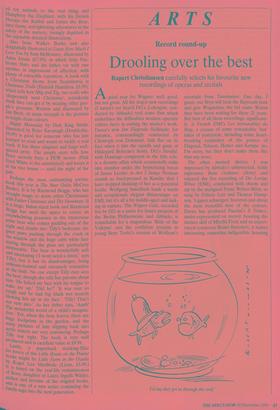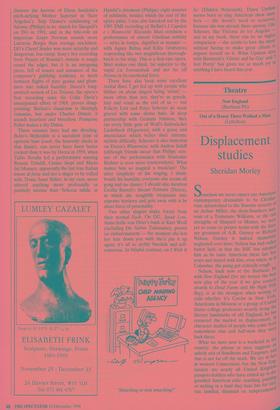ARTS
Record round-up
Drooling over the best
Agood year for Wagner: well, good, but not great. All the major new recordings (I haven't yet heard DG's Lohengrin, con- ducted by Abbado) trail some flaw which underlines the difficulties modern operatic culture faces in casting the master's work. Decca's new Der Fliegende Hollander, for instance, commandingly conducted by Christoph von Dohnanyi, falls flat on its face when it hits the squalls and gusts of Hildegard Behrens's Senta. DG's Parsifal, with Domingo competent in the title role, is a dreamy affair which occasionally sinks into slumber under the hypnotizing baton of James Levine: in Act 2 Jessye Norman sounds so hard-pressed as Kundry that I have stopped thinking of her as a potential Isolde. Wolfgang Sawallisch leads a warm and scrupulously elegant Meistersinger on EMI, but it's all a bit middle-aged and lack- ing in rapture. The Wagner Gala, recorded live by DG as a taster for future projects of the Berlin Philharmonic and Abbado, is remarkable for a stupendous 'Ride of the Valkyies' and the confident lyricism in young Bryn Terfel's version of Wolfram's serenade from Tannhaaser. One day, I guess, our Bryn will beat the Bayreuth bark and give Wagnerites the bel canto Wotan they have been waiting for these 25 years. But best of all these recordings, significant- ly, is French EMI's Les introuvables du Ring, a reissue of some remarkable 'lost' takes of yesteryear, including some heart- breaking reminders of the primes of Flagstad, Nilsson, Hotter and Kempe: no, I'm sorry, but they don't make them like that any more.
On other musical shores, I was impressed by Abbado's unhysterical, richly expressive Boris Godunov (Sony) and enjoyed the live recording of Die Lustige Witwe (EMI), conducted with charm and zip by the maligned Franz Welser-Most; as sung by Felicity Lott and Thomas Hamp- son, `Lippen schweigen' becomes just about the most beautiful tune of the century. Decca has produced Puccini's II Trittico, under-represented on record: boasting the mature skill of Mirella Freni and an experi- enced conductor Bruno Bartoletti, it makes interesting, somewhat indigestible listening 'I'd say they got in through the roof' (beware the horrors of Elena Souliotis's pitch-defying Mother Superior in `Suor Angelica'). Seiji Ozawa's conducting of Salome (Philips) is no match for Sinopoli's on DG in 1991, and in the title-role an imperious Jessye Norman sounds more Lucrezia Borgia than teenage sex-kitten: DG's Cheryl Studer was more scratchy and dangerous, less camp. Sony's live recording from Pesaro of Rossini's Armida is rough round the edges, but it is an intriguing piece, full of tenors and instances of the composer's giddying tendency to lurch between flights of pure genius and plum- mets into naked banality. Decca's long- awaited version of Les Troyens, the opera's first recording since Sir Colin Davis's unsurpassed effort of 1969, proves disap- pointing: Berlioz's classicism is blazingly romantic, but under Charles Dutoit, it sounds heartless and bloodless. Francoise Pellet makes a thy Didon.
Three reissues have had me drooling. Boito's Mefistofele is a succulent joint of operatic ham (000h, the heavenly choirs in that finale), can never have been better cooked than it was by Decca in 1959, when Tullio Serafin led a performance starring Renata Tebaldi, Cesare Siepi and Mario del Monaco, apparently the last true Italian tenore di forza and not a singer to be trifled with. Dame Janet Baker, in my view, never uttered anything more profoundly or painfully intense than `Scherza infida' in Handel's Ariodante (Philips): eight minutes of sublimity, besides which the rest of the opera pales. I was also knocked out by the 1985 EMI recording of Bellini's I Capuleti e i Montecchi: Riccardo Muti conducts a performance of almost Gluckian nobility — strict in tempo, dignified in manner — with Agnes Baltsa and Edita Gruberova responding like two magnificent thorough- breds to his whip. This is a first-rate opera, Muti makes one think, far superior to the vapid La Sonnambula and not far off Norma in its emotional force.
There have also been some excellent recital discs. I get fed up with people who blither on about singers being 'artists' — more often than not, they're as greedy, lazy and venal as the rest of us — but Felicity Lott and Peter Schreier do seem graced with some divine halo. In deep partnership with Graham Johnson, they cut every little gem of Wolf's Italienisches Liederbuch (Hyperion), with a grace and insouciance which belies their extreme stylistic difficulty. Schreier is also immortal on Decca's Wintetreise, with Andras Schiff (although friends swear that Philips' reis- sue of the performance with Sviatoslav Richter is even more transcendent). What makes him so magical a musician? The utter simplicity of his singing, I think: beside his humility, everyone else seems all gong and no dinner I should also mention Cecilia Bartoli's Mozart Portraits (Decca), in which she naughtily trespasses into soprano territory and gets away with it by sheer force of personality.
Two other singers make forays from their normal Fach. On DG, Speak Low, Anne-Sofie von Otter's bash at Kurt Weill (including Die Sieben Todsunden), proves an embarrassment — the moment she lets her hair down you wish she'd pin it up again, it's all so archly Swedish and self- conscious. In blissful contrast, on I Wish It 'Smacking or non smacking?' So (Elektra Nonesuch), Dawn Upshaw seems born to sing American show num- bers — she doesn't need to crossover, because she was already there anyway. Like Schreier, like Victoria de los Angeles — and in my book, there can be no higher comparison — she seems to love the music without having to make great efforts to impose herself on it. What Upshaw doe! with Bemstein's 'Glitter and be Gay' and I feel Pretty' has given me as much joy as anything I have heard this year.



































































 Previous page
Previous page